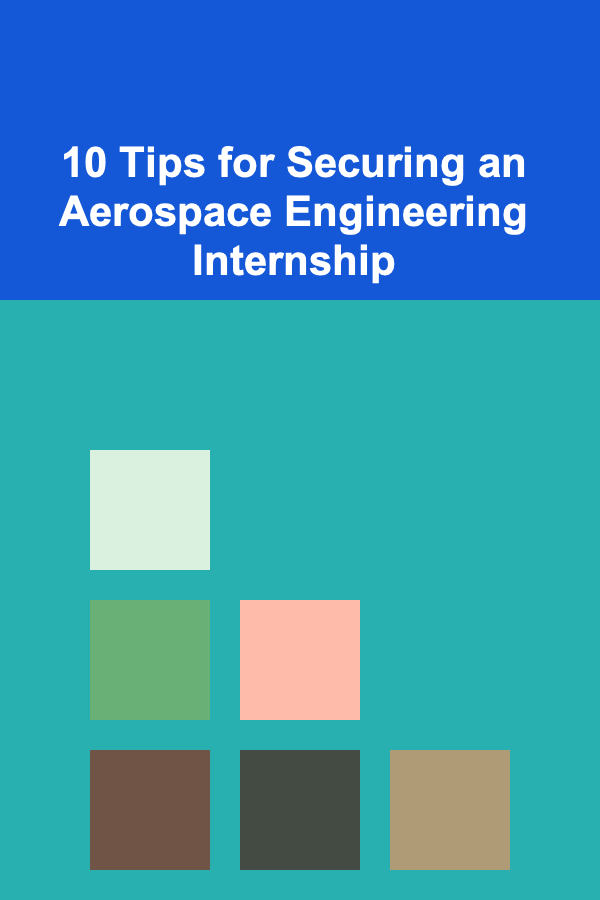
10 Tips for Securing an Aerospace Engineering Internship
ebook include PDF & Audio bundle (Micro Guide)
$12.99$7.99
Limited Time Offer! Order within the next:

Aerospace engineering is one of the most exciting and challenging fields within the engineering world. As an aerospace engineer, you'll work on technologies that make human flight, space exploration, and defense systems possible. However, securing an internship in aerospace engineering can be competitive due to the industry's demanding nature and the limited number of opportunities available. This article provides 10 valuable tips for students and aspiring professionals looking to land an aerospace engineering internship.
Start Early and Plan Ahead
Internship opportunities in aerospace engineering are highly competitive, and many large aerospace companies start recruiting interns as early as six months before the internship term begins. To maximize your chances, start your search well in advance. Ideally, begin researching internship opportunities in your sophomore or junior year, and start applying by the time you're entering your second-to-last semester of school.
Create a timeline of application deadlines for various companies and set reminders. This proactive approach will give you plenty of time to refine your application materials and give yourself a head start in the competitive hiring process.
Tailor Your Resume and Cover Letter for Aerospace
A resume and cover letter tailored to aerospace engineering are essential to making a strong impression. Many students apply to numerous internships, but those who stand out are those whose application materials are specifically aligned with the field.
Here's how to make your resume shine:
- Focus on relevant coursework: Highlight classes in subjects like aerodynamics, propulsion, materials science, control systems, and fluid mechanics. Include relevant projects and lab work to demonstrate practical experience.
- Showcase technical skills: Aerospace engineering is a field that heavily depends on specialized technical knowledge. Be sure to mention any software or tools you're proficient in, such as MATLAB, CATIA, SolidWorks, or AutoCAD.
- Include internships or related experiences: Even if you've had internships in other fields, highlight the transferable skills---problem-solving, teamwork, and leadership---that would apply to an aerospace engineering role.
- Use quantifiable achievements: Instead of simply listing your duties, describe what you accomplished. For example, "Designed a prototype for a UAV wing that reduced weight by 15% without sacrificing stability."
The cover letter is your chance to explain why you're passionate about aerospace engineering and why you'd be a great fit for the company. Customize each cover letter for each company and position, emphasizing how your background aligns with the company's mission and projects.
Gain Relevant Experience Through Projects and Competitions
Aerospace engineering is a hands-on field. Demonstrating that you've worked on projects or participated in engineering competitions can set you apart from other applicants. Many aerospace engineers gain valuable experience by working on:
- University research projects: Whether you're part of a faculty-led research team or pursuing your own research, these experiences can demonstrate your ability to work in a technical setting.
- Aerospace engineering competitions : Competitions such as the AIAA Design/Build/Fly competition , NASA's Student Launch Initiative , or the Aerospace Robotics Challenge are great ways to gain practical experience and stand out to employers.
- Personal projects: If you're passionate about aerospace, don't hesitate to start personal engineering projects, such as building model aircraft, drones, or even small rockets. Document the process and results for future interviews.
Network with Industry Professionals
Networking is a critical part of securing an internship, especially in fields like aerospace engineering. Many internships are filled through referrals, so it's important to build connections with industry professionals, professors, and alumni who may have insight into opportunities.
Here's how to network effectively:
- Attend aerospace-related events : Participate in career fairs, conferences, and seminars hosted by organizations such as the American Institute of Aeronautics and Astronautics (AIAA). These events provide networking opportunities with industry leaders, recruiters, and fellow students.
- Join student organizations : Being a member of student groups such as the Aerospace Engineering Club , Rocketry Club , or Robot Design Team provides access to mentors, industry professionals, and information about internship openings.
- Utilize LinkedIn: Create a strong LinkedIn profile that showcases your skills, experiences, and ambitions. Reach out to aerospace engineers or recruiters working for aerospace companies, and don't hesitate to ask for advice or mentorship.
- Tap into your university's alumni network: Many universities offer networking events with alumni working in aerospace engineering. Alumni are often willing to help current students, so take advantage of these events to make valuable connections.
Develop Technical Skills in Demand
Aerospace engineering requires specialized technical skills, and having a broad range of these skills will make you more marketable to employers. Here are some essential skills to develop:
- Computer-aided design (CAD): Proficiency in CAD software, such as CATIA, SolidWorks, or AutoCAD, is crucial for designing aircraft, spacecraft, and related systems.
- Finite element analysis (FEA): Knowledge of FEA software like ANSYS can help you analyze how designs will perform under real-world conditions. This is particularly important for stress and structural analysis.
- Programming skills: Familiarity with programming languages such as MATLAB, Python, or C++ is essential for simulations, algorithm development, and data analysis in aerospace projects.
- Control systems and aerodynamics: Understanding control systems and aerodynamics is a fundamental aspect of aerospace engineering. Familiarize yourself with topics like stability and control, flight dynamics, and propulsion systems.
The more technical skills you can offer, the better equipped you'll be to contribute to aerospace engineering projects and add value to an internship.
Leverage Your School's Career Center
Most universities have career centers that can provide valuable resources in your job search. These centers often have strong relationships with companies and can help you find aerospace engineering internships. They can offer services like:
- Resume and cover letter reviews: Career counselors can help you polish your resume and cover letter, ensuring they stand out to recruiters.
- Interview preparation: Career centers often conduct mock interviews or provide tips on how to perform well in interviews, which are essential when applying for competitive internships.
- Job listings: Many aerospace companies post internship opportunities directly on university career portals, so make sure to regularly check these listings.
- Networking events: Universities often organize networking events with companies looking to hire interns, so attending these events can give you a direct line to recruiters.
Apply to a Wide Range of Companies
While top aerospace companies like NASA , Boeing , and Lockheed Martin are highly sought after, don't limit yourself to just the industry giants. Many smaller aerospace companies, defense contractors, research institutions, and startups also offer valuable internship experiences. These opportunities can provide a different kind of exposure and allow you to work on projects that may not be available in larger organizations.
Here's a list of companies that offer aerospace internships:
- SpaceX
- Northrop Grumman
- Raytheon Technologies
- General Electric Aviation
- Blue Origin
- Pratt & Whitney
- GE Aviation
Additionally, don't overlook opportunities in related industries, such as automotive, robotics, or energy, where aerospace engineering skills are in high demand.
Showcase Your Soft Skills
In addition to technical expertise, employers in aerospace engineering value strong communication, teamwork, and problem-solving skills. Engineering is a highly collaborative field, and the ability to work effectively in teams, communicate technical concepts clearly, and adapt to changing project needs is essential.
To demonstrate these skills:
- Highlight group projects: If you've worked in teams on technical projects or competitions, emphasize how you collaborated with others and contributed to the team's success.
- Communication skills: If you've ever given a presentation, written a technical report, or led a meeting, include these experiences on your resume to show that you can communicate complex ideas effectively.
- Problem-solving abilities: Aerospace engineering often requires creative problem-solving, especially when tackling new or unexpected challenges. Show examples of times when you found innovative solutions to engineering problems.
Stay Up-to-Date with Industry Trends
Aerospace is a rapidly evolving field, with constant innovations in technology, materials, and design. Staying informed about the latest trends in aerospace engineering not only makes you more knowledgeable but also demonstrates your passion and commitment to the field.
Here's how to stay informed:
- Read industry journals : Publications like Aerospace America and AIAA Journal provide valuable insights into the latest research, developments, and technologies in aerospace engineering.
- Follow industry blogs and social media: Many aerospace engineers and companies maintain blogs and social media channels where they share updates on new projects, innovations, and trends.
- Attend conferences and webinars: Industry events provide opportunities to learn about the latest breakthroughs, as well as network with professionals.
Be Persistent and Follow Up
The internship application process can be lengthy, and rejection is common, but persistence is key. If you don't get an internship on your first try, don't be discouraged. Use feedback, refine your application, and try again.
After submitting applications, follow up with a polite email to show your continued interest in the position. A well-timed follow-up can help your application stand out and demonstrate your enthusiasm for the role.
Conclusion
Securing an aerospace engineering internship can be a challenging process, but with the right strategy, preparation, and mindset, it is definitely achievable. Start early, tailor your application materials, gain hands-on experience, and network actively. By demonstrating your passion for aerospace engineering, technical expertise, and strong soft skills, you'll greatly increase your chances of landing a rewarding internship that will set you on the path to a successful aerospace career.
Reading More From Our Other Websites
- [Home Rental Property 101] How to Design and Maintain Safe Apartments for Rent with a Fire Pit Feature to Attract Desirable Renters
- [Personal Finance Management 101] How to Make the Most of Your Retirement Accounts
- [Home Party Planning 101] How to Plan an Eco-Friendly Home Party with Sustainability in Mind
- [Organization Tip 101] How to Stay Connected with Classmates During Remote Learning
- [Home Staging 101] How to Use Textures and Fabrics for a Cozy, Inviting Staged Home
- [Personal Care Tips 101] How to Identify and Address Skin Sensitivity to Certain Ingredients in Skincare Products
- [Home Maintenance 101] How to Keep Your Home's Doors and Locks in Working Order
- [Organization Tip 101] How to Plan for Seasonal Changes in Your Entryway Organization
- [Small Business 101] Small Business Management: Essential Tips for Effective Leadership
- [Weaving Tip 101] Beyond the Loom: Creative Upcycling Ideas for Modern Weaving Projects

How To Become an Event Planner
Read More
How to Create a Nature Photography Album
Read More
How to Create an Efficient Pantry Organization System
Read More
How to Use a Checklist to Achieve Your New Year's Resolutions
Read More
How To Prepare Children for Cultural Differences
Read More
How to Make Basic Bread Dough: A Comprehensive Guide
Read MoreOther Products

How To Become an Event Planner
Read More
How to Create a Nature Photography Album
Read More
How to Create an Efficient Pantry Organization System
Read More
How to Use a Checklist to Achieve Your New Year's Resolutions
Read More
How To Prepare Children for Cultural Differences
Read More